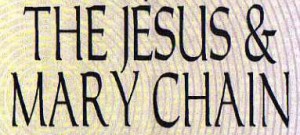Jesus and Mary Chain reconnect in China

But much has changed in the 27 years since the release of their influential debut album Psychocandy, whose combination of 1960s pop and punk menace has manifested itself in the DNA of countless rock bands since.
The Glaswegian band are preparing to play their first ever show in China. A slot at the China Music Valley festival in Beijing on Saturday will be followed by a date in Hong Kong next week and a show in Singapore.
“We’d never been to China before, and thought we should take the chance to have a new experience,” singer Jim Reid told Agence France-Presse by telephone from his seaside home in Devon, England, where he admits “doing the school run is about as exciting as it gets these days.”
It is just one illustration of change for a band whose music first planted them left-of-field, but whose influence can now be seen and heard in the mainstream as the Internet gives even the most esoteric acts a platform.
“We’d have been a lot more successful if we’d been around in this particular climate,” Reid, 50, said.
“Whether it’s more geared towards pop – today’s radio stations would still rather play Lady Gaga – thanks to the Internet, guitar bands have a place to be heard.”
Reid and his older brother William certainly had to fight to get noticed in an early 1980s Britain polarised by Thatcherism and high unemployment.
Inspired by punk band The Sex Pistols, the brothers’ early influences also included The Velvet Underground, The Stooges and The Shangri-Las as they began playing in 1984 using deliberately de-tuned instruments, noise and feedback.
“We were sneaking in the back door and willing to do anything to get noticed really,” Reid said. “We came from East Kilbride, we had been on unemployment benefit, suddenly we got noticed. We didn’t know what the rules were in the first place, so we couldn’t play by them.”
The band’s artistic impact continues to be felt, inspiring bands ranging from My Bloody Valentine to Dinosaur Jr., Spiritualized and The Horrors.
Original members Bobby Gillespie went on to form Primal Scream and Douglas Hart became a successful video director.
The Reids’ iconic look of skinny black jeans, leather and shades, meanwhile, is now mandatory in the playbook of any aspiring indie act.
Briefly touted in the 1980s as Britain’s most notorious band, some towns banned The Jesus and Mary Chain from playing amid exaggerated tales of drugs and violence after outbreaks of fighting at some shows.
They disintegrated in 1999 as tensions between Reid and guitarist brother William became unworkable. “Back in the 1990s we’d argue over anything,” Reid said.
“It’s always going to be a stormy relationship between my brother and myself. We just know where the line is now, and if you cross it there’s going to be hell. We’re both able to back down more than before.”
The band returned in 2007, performing at the Coachella festival in the US with actor Scarlett Johansson appearing on stage to sing “Just Like Honey” after the track was used in the 2003 movie “Lost in Translation”.
Reid said a new album has been “discussed” but not recorded, and the band continues to tour sporadically, with a string of North American dates lined up for June.
Far removed from the chaotic early 1980s concerts that saw the band play 20-minute shows, sometimes with their backs to audiences, Reid said the Asia dates would comprise a “best of” spanning their six albums between 1985 and 1998.
In particular for Beijing and Hong Kong, where British indie music has a strong following, the shows will present the opportunity to hear songs from a debut that still resonates today.
“At that time nobody was doing that kind of music – that kind of pop-noise took everybody by surprise,” said Reid when asked about Psychocandy’s impact. “It has lasted because we were good at what we were doing.”